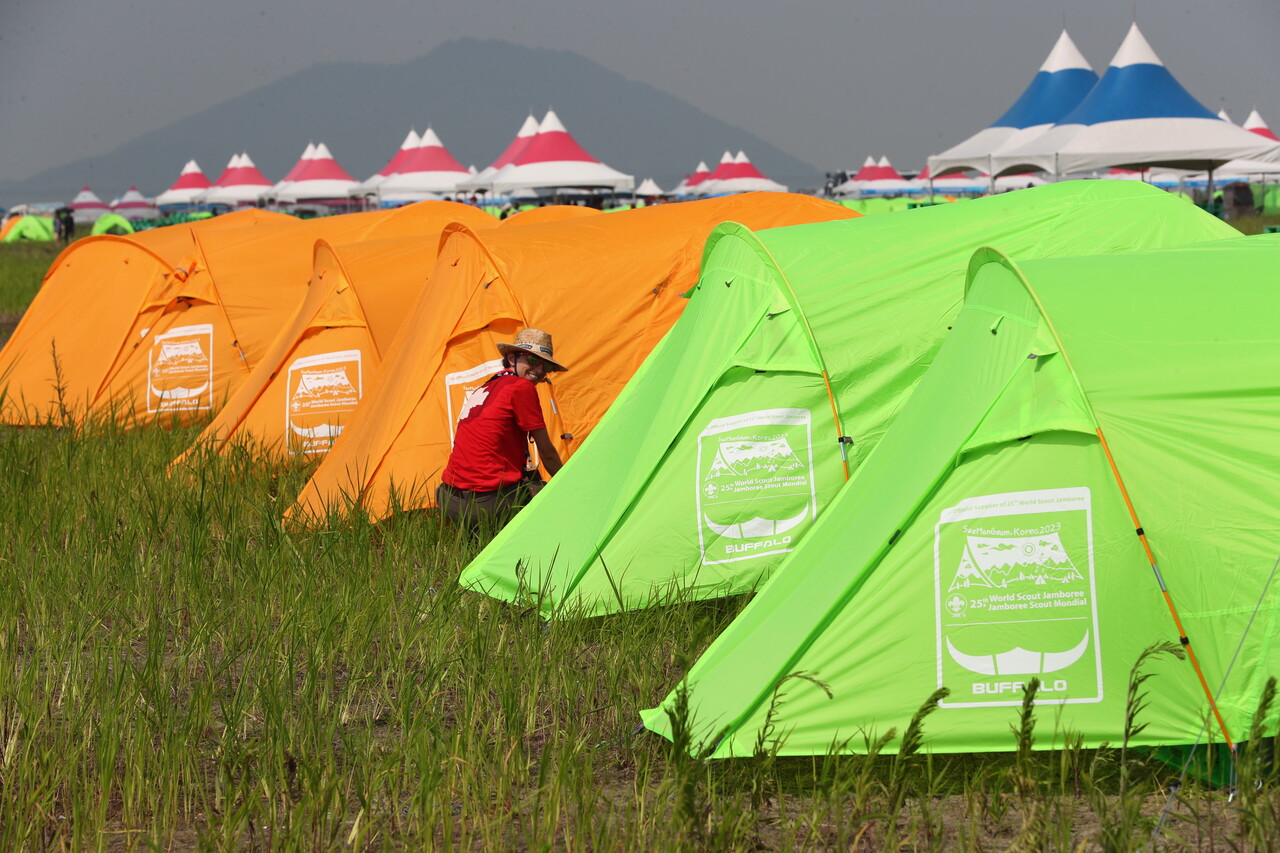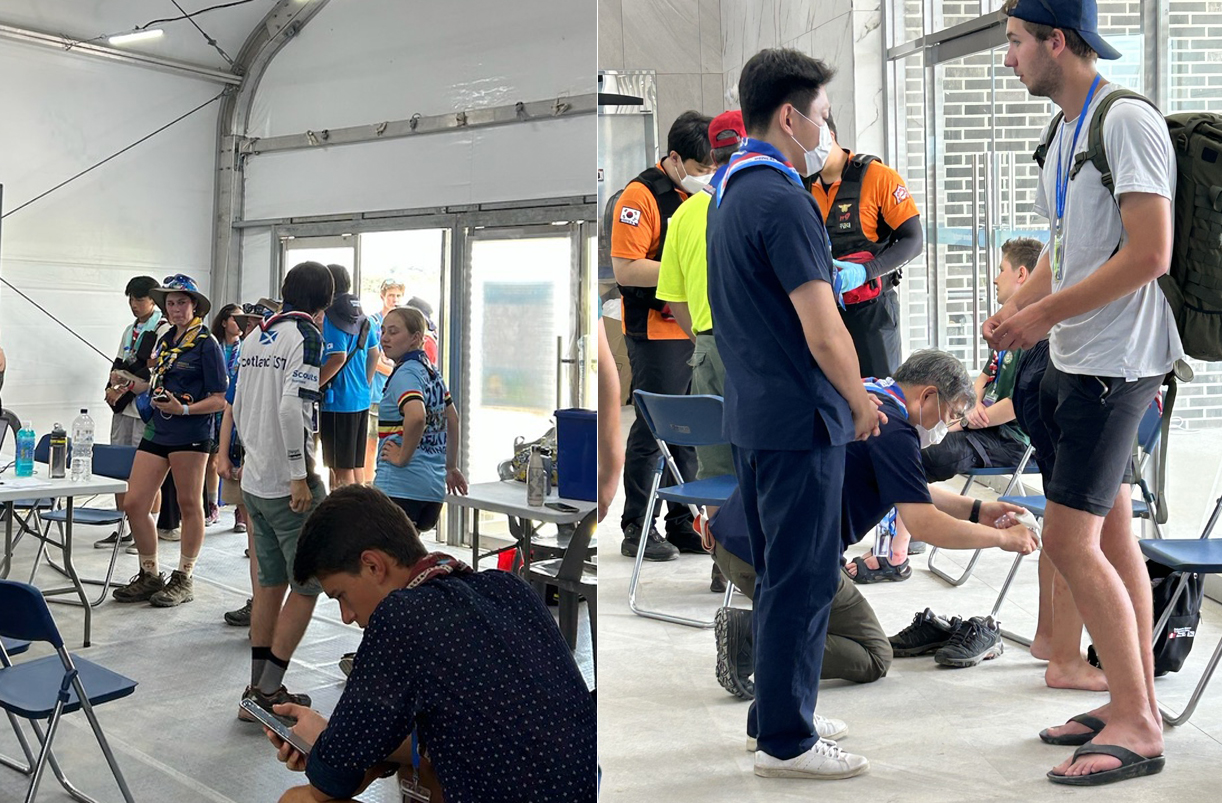
The 25th World Scout Jamboree in Saemangeum, North Jeolla Province, raises concerns as many participants suffer from heat-related illnesses.
The provincial doctors’ group and other organizations are providing medical support, but there have been calls for an immediate suspension of outdoor activities due to the record-breaking heat.
Pediatricians have officially requested that the event be stopped immediately.
According to the organizing committee of the jamboree, there have been 1,757 cases of heat stroke patients in the campsite over the past two days, with more than 600 of them confirmed to be suffering from heat exhaustion. Buan Country, where the jamboree is being held, has been experiencing a heat wave, with temperatures exceeding 34 degrees Celsius (C) from Aug. 1 to 3, even reaching a peak of 38 C at one point.
As the heat wave continued on Thursday, the province requested the Jeonbuk Medical Association to send medical personnel. The association recruited 30 doctors, nurses, and administrative staff to provide support at the campsite. It also sent additional amounts of Normal Saline and Hartman Sol, used to treat dehydration symptoms.
It is reported that the supply of these medicines was exhausted due to a surge in the number of people with heat-related illnesses.
"We prepared a workforce pool of 30 medical volunteers. The demand for the Hartman Sol and Normal Saline is surging due to the increasing number of dehydrated patients. Together with Chonbuk National University Hospital and Wonkwang National University Hospital, we provided about 600 boxes each to the field, said Kim Jong-gu, chairman of the Jeonbuk Medical Association, in a phone interview with Korea Biomedical Review. "The North Jeolla Provincial Government is in constant communication with the field personnel to cooperate."
In the event of a serious illness, there will be smooth transfers of patients to nearby national university hospitals, Kim said.
"However, concerns remain about preventing people from being hit by heat strokes. This depends on the direction of the jamboree operation that the organizing committee decides," Kim added.

The doctors at the jamboree site also go all out to provide the best treatment. The camping ground has a jamboree hospital, five herbal clinics, and five emergency medical centers.
According to medical volunteers, most hospital patients have heat-related illnesses. However, there are also people with various troubles related to outdoor activities, including headaches due to sun allergies, digestive diseases, diarrhea, skin diseases caused by too much exposure to sunlight, and insect bites.
Teenagers and adults, including volunteers and interpreters, are coming to the hospital.
A doctor dispatched to the hospital in the camp said that the site was somewhat chaotic at first, but it resumed normalcy as more staff were dispatched and air conditioners were installed.
"Not only Jeonbuk Medical Association but also professors and specialists from university hospitals have volunteered, so there is no shortage of medical personnel," the doctor said. "However, as a volunteer, there are limitations to accurately grasping the situation."
On the other hand, the five herbal clinics, located away from the hospital and among the tents, were in poorer conditions.
An internal medicine specialist working at the jamboree clinic emphasized that the priority is to stop outdoor activities to prevent continuous outbreaks of heat strokes.
"I think the problems that occur in the field, such as communication between doctors and officials, can be judged afterward. However, to prevent further outbreaks, we must stop their outdoor activities,” the specialist said. “If we can't do that, there can be no appropriate countermeasures. For now, we have no other options to treat visitors to clinics as best as we can.”
There are not much doctors can do except for making patients take rest, giving fluids, and reassuring them, the doctor added.
The Korean Pediatric Society sent a letter calling for the suspension of the jamboree to related agencies, including the Ministry of Gender Equality and Family Affairs, the Ministry of Interior and Public Safety, and the Korean Scouting Federation.
"Heat-related illness is a fatal disease that can cause nausea, vomiting, dizziness, altered consciousness, and even death," said Lim Hyun-taek, head of the society. "There have already been more than 600 cases of heat illnesses in just three days of the event. We urge the authorities to prioritize the health and safety of the world's youth and cancel the jamboree immediately."

